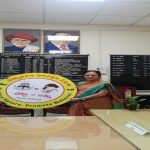Is anger over the ‘liberators’ quota’ the current developments shaking Bangladesh? Political analysts say that the issue of reservations is only a superficial reason!
Is anger over the ‘liberators’ quota’ the current developments shaking Bangladesh? Political analysts say that the issue of reservations is only a superficial reason! They analyze that Bangladesh is developing economically, but the fruits are not getting to the people in the form of jobs, Awami League in power since 2009, irregularities, corruption, arrests of opposition leaders, the situation of opposition boycotting the elections.
After gaining independence in 1971 war.. Bangladesh’s first Prime Minister Sheikh Mujibur Rahman in 1972 reserved government jobs for freedom fighters (30%), war victims (20%), poor, backward districts, tribals and minorities (30%). After his death, the government of that country reduced the reservation to 60 percent in 1976.
The remaining 40 percent jobs have started to be filled on the basis of talent. By 1996, reservations had reduced to 55 percent. However, after 1997, the recruitment of freedom fighters in the quota started decreasing gradually. The reason for this is that all of that generation died of old age. As a result, the then government of Sheikh Hasina started applying that quota to the children of freedom fighters.
In 2010, the quota was also made applicable to the grandchildren of freedom fighters. In 2012, a 1 percent quota was applied to persons with disabilities. With this again the reservation increased to 56 percent. In 2018, when protests erupted across Bangladesh against this quota system, Hasina’s government took a decision to lift all types of reservations in first and second-tier jobs. Some descendants of the freedom fighters approached the High Court in 2021 against this decision.

After the High Court ruled on July 1 this year that the circular issued by the Hasina government for lifting reservations was invalid, the students hit the road again. The government approached the Supreme Court. On July 14, Hasina compared the protesters to terrorists and said, ‘Should reservations be given to the descendants of the freedom fighters and not to the descendants of the Rajakars?’ Asking sarcastically escalated the situation. “Yes, we are Razakars.. If those who question injustice are Razakaars.. We are Razakaars” and increased the intensity of the protests.
At that time, the Hasina government, which should have dealt with the students and solved the problem, decided to suppress the movement with an iron foot. Curfew was imposed and the armed forces were deployed. On July 18, more than 200 people were killed in clashes between the armed forces and protesters.
Thousands were injured. On July 21, the Appellate Division of the Supreme Court ruled that the 30 percent quota given to the descendants of emancipated people would be reduced to 5 percent, the quota for the disabled to one percent, and the combined reservation for minorities and transgenders to one percent. It has paved the way for filling the remaining 93 percent jobs on the basis of talent. But, in its judgment, the government has the discretion to change these quotas in future. According to that verdict, the government has taken a decision and issued orders to that effect. But, the situation has already gone out of hand.

Pakistan’s hand?
Reliable sources claim that Pakistan is behind the Bangladesh turmoil. Chhatra Shibir, a student organization of the banned Jamaat-e-Islami, which supported the student agitations, is under the auspices of Pakistan’s intelligence agency ISI. The sources claim that it played a key role behind turning the student movement into a political movement. They explained that their objective was to topple the pro-India Hasina government.
Development under Hasina
The student movement has social and economic dimensions. In the past decade and a half, that is, since Sheikh Hasina took the reins again in 2009, Bangladesh has developed economically. It has become the world’s largest readymade garment manufacturing hub and exports garments to international brands. There are 4 crore jobs in that sector… they are private jobs. Salary is low. More work.

The government jobs with appropriate salaries are allotted to the ruling Awami League Party cadres and ranks under the quota of freedom fighters, and the rise in inflation in the country due to rampant corruption has caused anger among the people. To vent that anger is extreme restraints. There was such a fearful atmosphere that one could not even protest. In these fifteen years, 80 people who criticized the government went missing. Their family members do not have any information about them.
There are allegations that the government killed them. On the other hand… the opposition BNP and some other parties boycotted the 2014 and 2024 elections because they did not believe that the elections would be held impartially while Hasina was in power. She resigned and announced that they will contest only if the elections are held in a free environment. All this caused the anger of the people to reach a peak.










